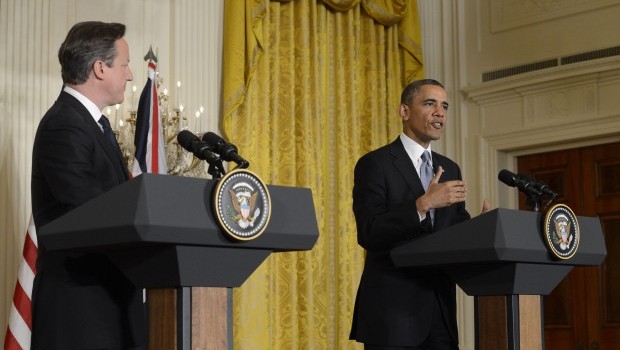
US president Barack Obama (R) and UK prime minister David Cameron (L) hold a joint news conference in the East Room of the White House following their bilateral meeting, in Washington DC, USA, 13 May 2013 (EPA/MICHAEL REYNOLDS)
London, Asharq Al-Awsat—The US and the UK have agreed to increase the pressure on Syrian president Bashar Al-Assad to negotiate with the rebels following a meeting between the British prime minister and the American president in Washington, DC, yesterday.
Speaking at a press conference at the White House after their meeting, President Obama told reporters, “We’re going to continue our efforts to increase pressure on the Assad regime, to provide humanitarian aid…to strengthen the moderate opposition and to prepare for a democratic Syria without Bashar Al-Assad.”
However, neither Obama nor Cameron announced any substantive changes in existing policy, such as supplying arms to Syria’s rebels.
In a US radio interview, Cameron said that the UK had not decided to supply weapons, but added that the British government would double the existing humanitarian and non-lethal aid it supplied to the Syrian opposition over the next year.
The two men are also reported to have discussed the plans for an international conference on the Syrian crisis agreed earlier this month in Moscow and announced by US secretary of state John Kerry and Russian foreign minister Sergei Lavrov.
While expressing support for the conference, president Obama also said that he remained cautious about its chances for success.
He told reporters that there remained “lingering suspicions” about Russia’s commitment to a transition of power in Syria, even though as “a leader on the world stage, Russia has an interest, as well as an obligation” in seeing an end to the crisis that has so far killed more than 75,000 Syrians and displaced millions more.
Obama also warned that the nature of the conflict in Syria made a peaceful resolution difficult to achieve, saying that “once the furies have been unleashed…[it is] very hard to put things back together.”
